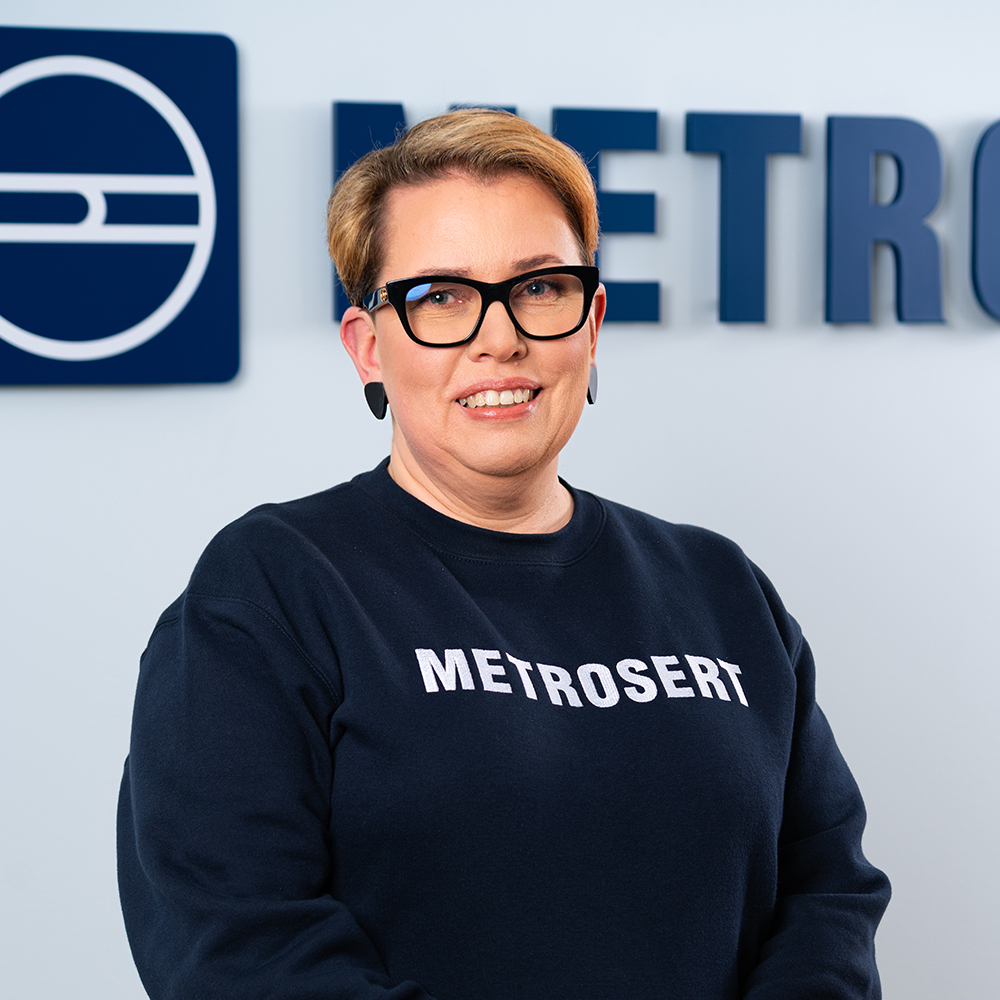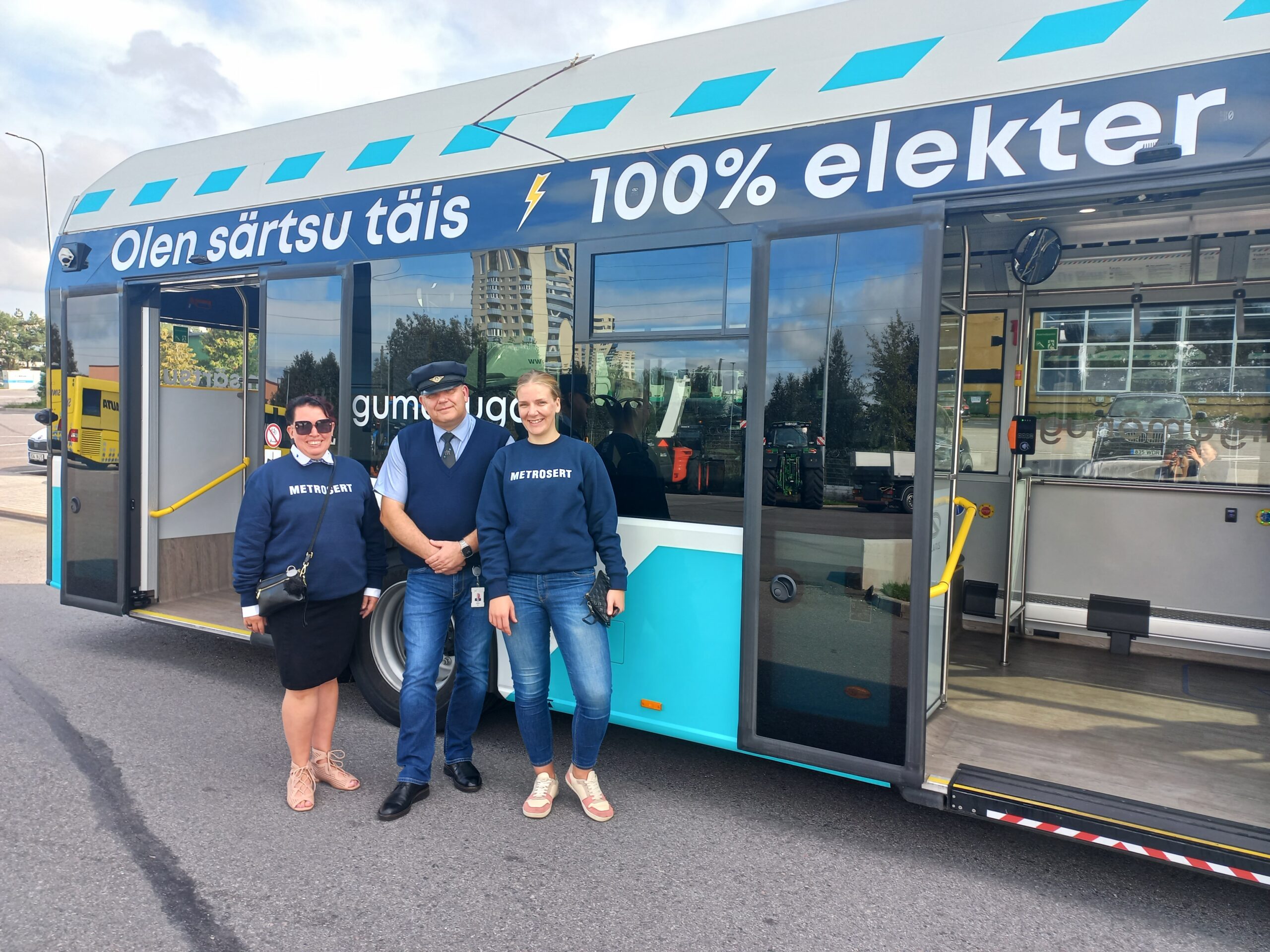
Terms like certification, quality, and systematic processes often bring bureaucracy to mind. Yet behind them lies fascinating work with a wide range of businesses. Evelin Kurmiste, Head of the Certification Division at Metrosert, helps Estonian companies grow sustainably. In the following interview, Evelin shares how she got into auditing and why she approaches her work thoroughly, humanely, and passionately.
How did you start working at Metrosert?
My cooperation with Metrosert began in 2010, when I was actually sitting on the other side of the table—as one of the audited parties. That same year, I defended my bachelor’s thesis, which involved implementing a management system in a small company. When we were looking for a partner to certify us, we ultimately chose Metrosert. We even ordered a training from them on quality management systems for the whole company. I stayed on the side of the small company as the lead for the quality management system, even though my main job was coordinating environmental projects. By 2018, I felt that seventeen years of project experience was enough—it was time for a change. I saw Metrosert’s job posting, applied, and have been here since the beginning of 2019.
What kind of education and background is needed for such a complex and, to some, perhaps rather abstract job?
I studied public administration at Tallinn University of Technology, which gave me a broad educational base and strong skills in proper documentation. As a child, I dreamed of becoming a secretary because my mother was a city secretary and I loved typing on the old Soviet-era typewriter. That’s probably where my interest in documents and doing things properly began.
I’d say I’m naturally thorough—but not a nitpicker! In projects, you had to keep very close track of whether the funding was used correctly and if the documentation met all requirements. Earlier in my career, I also worked in the court system, so I’ve always been in roles where precision and provability were essential. Quality management isn’t typically the dream job of a young person. When I joined Metrosert, I was the youngest on my team. Since then, I’ve almost become the oldest. It’s great to see young people eager to learn. A key trait for an auditor is the willingness to keep learning. We constantly need to broaden our horizons, learn about new fields, and stay updated on legislative changes.
“I hope certification will no longer be seen as pointless bureaucracy, but as something that adds real value to a company.”
Is moving from public administration to auditing a common career path?
Not really. When I wrote my thesis on implementing an ISO quality management system, that itself was already quite unique. One of my thesis advisors wasn’t even from the university—it was someone from the field. Through a connection, I found a company that needed a quality system, and I combined my thesis with the actual implementation. That’s how I got the bug.
When should a company consider getting certified and contact Metrosert?
Metrosert is a certification body, and when a company comes to us, it usually wants to be certified—whether for a quality, environmental, occupational health and safety, or other management system. A common question I hear is, “Are we ready?” I like to say that if a company is already functioning well, has a customer base, and receives positive feedback, then they’re already fulfilling most of the standard requirements. Often, these practices just haven’t been written down. The goals and risks exist in the manager’s mind, and customer requirements come from the customer anyway. So the basics are already there. A management system is about structured management. All companies could benefit from implementing one—whether they pursue certification or not. But the certificate adds value because an independent third party has validated the system.
In Estonia, we still have relatively few certificates, and there could definitely be more. In sectors where procurement requires them, the trend is growing. It’s encouraging to see a rising trend in environmental management systems, as well as occupational health and safety certifications, especially among companies connected to Scandinavia. Green thinking, climate neutrality, and employee well-being are becoming increasingly prominent and can no longer be ignored.
What does a typical workday look like for an auditor?
A workday often starts with leaving home at five or six in the morning and ends late in the evening. An audit day typically lasts eight hours onsite at the client’s premises. For large companies, audits can last several days. We travel to the site, conduct the audit, and either return that evening or stay overnight if it’s a multi-day audit. It’s a bit of an adventure—tiring but exciting. A good rule of thumb: if auditors aren’t in the office, they’re working!
Behind the scenes, there’s also a lot more to do: assessing competencies, participating in training, training new auditors, working with accreditation bodies and partners, preparing certification offers, signing contracts with clients, and so on. Auditing itself is the most interesting part because you get to see what clients actually do. There’s a lot of communication with all sorts of people. You need to adapt quickly and shift gears as needed. But everything you see and hear must also be documented, which adds some routine to the job.
Can you share a memorable audit experience?
We have a very diverse client base—from construction and manufacturing companies to IT firms and wholesalers. I particularly enjoy auditing large companies or environmental management systems, although I audit nearly all systems in Metrosert’s portfolio.
For example, Eesti Raudtee (Estonian Railways) is a large and complex audit—many locations and days of work. Tartu University Hospital is another major client; their environmental audits are lengthy but interesting. Some of our clients manufacture for international markets. We also work with clothing producers, furniture makers, waste handlers—so many different and exciting companies. And truly, each one has its own character, which keeps the work engaging.
What does the future of certification look like?
This field isn’t going anywhere. If anything, it will become more specialized due to global developments and new regulations. Think about all the risks surrounding us every day—quality will always matter. The value of high-quality products and services is being recognized more and more.
I hope people no longer see certification as meaningless bureaucracy, but as something that adds real value. We need to raise awareness about the importance of quality, environmental, and occupational health and safety systems—especially among company leaders. If leaders understand and believe in systematic management, and show that belief in their actions, employees will follow.
Long workdays seem to come with the territory. How do you unwind?
I spend my free time with my family. Since my work involves a lot of interaction, I prefer quieter moments with family in my spare time. I have a big house and garden, which keeps me busy. Gardening, especially in spring, when everything comes alive—it’s a real energy boost. The commute to the office takes about forty minutes, and on the road to audits, I listen to music and gather my thoughts. I’m eclectic in my music and book tastes. I have a stack of books by my bed waiting to be finished.
Though less often nowadays, I also do machine embroidery. It requires concentration and creativity but helps me completely disconnect from everyday worries. Sometimes I help friends and colleagues create personalized gifts.
Where do you see yourself in ten years?
I believe I’ll still be doing this work. I enjoy what I do. As long as the field evolves and remains exciting, I’m happy to keep going. I’m quite loyal, and if the work is interesting and challenging, there’s no reason to change it. The main thing is not to get bored. I have many ideas for the future, and there’s no shortage of challenges. New certification services are already lined up. There are plenty of standards out there, and we’re here to assess compliance—so the work is endless.
I definitely need communication and action—I’m not one to sit still, and this job certainly provides plenty of both. Plus, I have an awesome team to take on all the challenges with.

